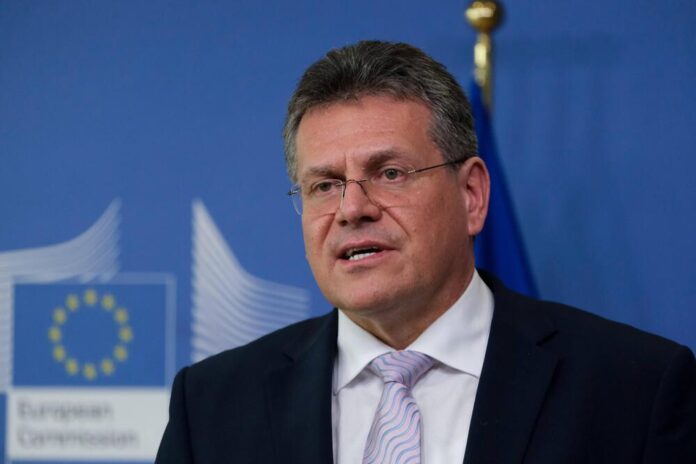The European Union’s trade commissioner, Maros Sefcovic, met with top U.S. trade officials in Washington on Tuesday in an effort to prevent the imposition of steep tariffs on EU goods next week.
Sefcovic described the discussions with Commerce Secretary Howard Lutnick, U.S. Trade Representative Jamieson Greer, and White House economic adviser Kevin Hassett as “substantive” but did not indicate whether any progress had been made.
The EU has been pushing for a fair and balanced trade agreement instead of facing what it considers unjustified tariffs. Two previous rounds of discussions have failed to change President Donald Trump’s plans to raise U.S. import duties to match those of major trading partners and counteract non-tariff trade barriers.
Several countries are already making trade concessions ahead of Trump’s expected April 2 tariff announcement, a day he has labeled “Liberation Day” for the U.S. economy. India has signaled its willingness to reduce tariffs on more than half of U.S. imports valued at $23 billion, including high tariffs on various goods.
A U.S. trade delegation, led by Assistant U.S. Trade Representative Brendan Lynch, is currently in New Delhi for discussions that will continue through Saturday.
Trump has indicated that some countries may receive exemptions or reductions in tariffs but has not provided specific details. He has also warned of separate tariffs on automobiles, pharmaceuticals, and aluminum in the near future.
The EU has struggled to deter Trump from escalating a trade dispute as he pursues a multi-front tariff strategy that could trigger significant retaliatory actions. After Trump imposed 25% tariffs on steel and aluminum imports earlier this month, Sefcovic acknowledged that talks with Washington had seen little progress.
European Commission spokesman Olof Gill reiterated the EU’s stance that both sides should work to strengthen, rather than weaken, their economic relationship. The EU has expressed willingness to negotiate automotive tariffs, including its own 10% car tariff and the U.S. 25% truck tariff, but has yet to reach an agreement.
Canadian Prime Minister Mark Carney said in Halifax that Canada is prepared to implement retaliatory trade measures depending on Trump’s April 2 trade decisions. Trump has threatened to end a temporary tariff exemption for goods that comply with the U.S.-Mexico-Canada free trade agreement.
Carney, however, stated that Canada is not rushing into negotiations, emphasizing the need for discussions between sovereign nations rather than reacting to external pressure.
White House officials have warned that countries seeking early tariff relief are unlikely to avoid them entirely, as Trump’s calculations will take into account non-tariff barriers, currency policies, and other factors that are difficult to reverse. The EU plans to delay its first countermeasures until mid-April, which will include a 50% tariff on U.S. bourbon.
In response, Trump has threatened to impose a 200% tariff on European wines and other alcoholic beverages if the EU proceeds with retaliatory actions.
Trump’s administration has identified 15 countries with the largest goods trade surpluses with the U.S. as primary targets for its reciprocal tariff strategy, though specific nations have not been officially named. The Office of the U.S. Trade Representative has requested public comments on the proposed tariffs, focusing on major trading partners such as China, the EU, Mexico, India, South Korea, and several Southeast Asian nations.
Countries identified as high priority account for approximately 88% of U.S. goods trade, with the administration indicating that further trade actions could be taken against those with the largest imbalances.




